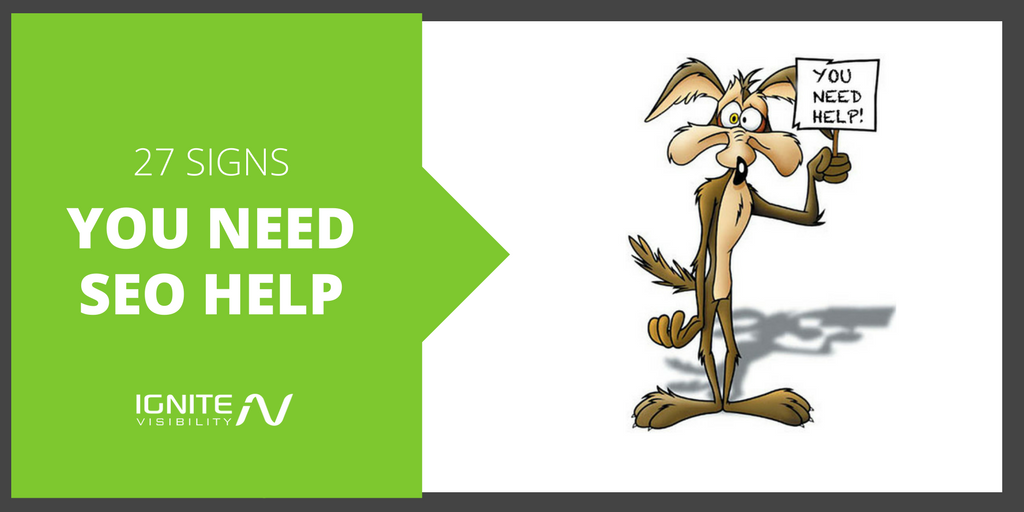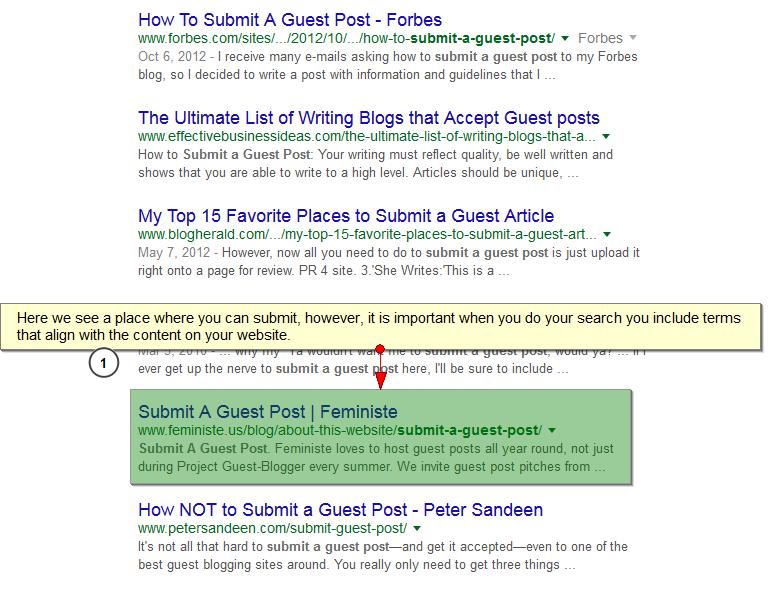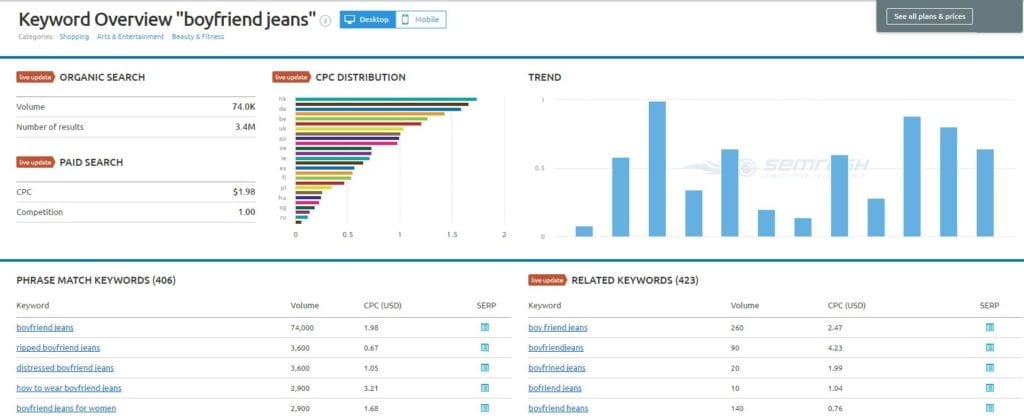Do you need SEO help?
Read this article, and by the end, you’ll know. The article also covers some important points of SEO you may find interesting.

27 Signs you Need SEO Help
SEO seems simple enough. Plug in a keyword here, add a link there, and voila – you’re sitting pretty on Google’s first page.
Not so fast.
What seems simple is actually incredibly complex, and requires time, attention, and plenty of planning. And any misstep could mean a serious hit to your rankings.
Here’s how you’ll know if it is time for some SEO help.
-
Your traffic is not growing (you need SEO help)
Website traffic at a stalemate? The reason for the stall could point to SEO issues.
One of the side effects of poor SEO is that your site won’t rank well in search engines, making it harder for customers to find your site. If search engines don’t know you exist, potential customers won’t either.
-
You have canonical URL issues (you need SEO help)
Your canonical URL is the one you want search engines to see. The problem is, other URL’s with similar or duplicate content often exist, making it hard for search engines like Google to decipher which they’re supposed to index and rank.
This may be a very real issue for you if you’re not using rel=canonical tags or redirects to point search engines in the right direction. If this sounds like you, make sure you web team takes some time to clean up your URL’s.
-
Your website is not mobile ready (hello?)
In 2016, mobile overtook desktop as the primary device used to search websites, meaning that search engines like Google are starting to unveil major “mobile first” initiatives. For brands, it means that mobile-friendliness will be an increasingly important ranking factor, and could spell trouble for those yet to make the move to mobile.
-
You are not incorporating social into your SEO strategy (you need SEO help)
Social media profiles are often among the top results in search listings for businesses, Though Google has stated that they don’t use major social networks as ranking factors, many view social as an important indirect factor. Shared content can lead to boosts in engagement and links, which do factor into Google rankings.
-
You have rankings, but no conversions (you need SEO and CRO help)
SEO help only takes you so far.
Think the job is done when you make it to the first page of Google? Think again.
While traffic and high rankings are undoubtedly valuable, the end goal is really conversions. To ensure your site is converting, you have to take a deep look into your content and user’s behavior.
Which pages do they visit, and is your site easy to navigate? Is your content valuable? Do you use CTA’s?
Answering questions like these will help uncover the root of why your customers may not be converting.
-
You’re are not on HTTPS
HTTPS – the secure version of HTTP – is a ranking signal for Google, and sites using HTTPS are indexed above unsecured pages. Therefore, businesses that haven’t made the move will not rank as well as those that have.
Watch a video and read a blog on HTTPS
-
You are not doing content marketing
Quite simply, you can’t have effective SEO without content marketing. The two are the dynamic duo of the marketing world, and the key to properly executing an SEO strategy is the content.
Here’s a (brief) breakdown:
You need keywords for SEO. Content delivers those keywords.
You need backlinks for SEO. Good content drives those backlinks.
You need consistent material to rank higher in search engines. New, consistent content gets the job done.
-
Your website is not broken out into segments
Segmenting your site makes it easier for searchers – and search engines – to understand and navigate.
-
You don’t have image, video, html and RSS feed sitemaps
Sitemaps are the roadmaps for both search engines and users – without them, they’ll likely get lost. Sitemaps help with SEO, as they get pages into the index.
A sitemap will list all the links to your site, and some kinds of content require a certain kind of sitemap. These include:
- Image: These help search engines index your images in Google image search.
- Video: Similar to image sitemaps, these give search engines data about your videos such as descriptions, run times and categories.
- HTML: These help users navigate and understand your site.
- RSS feed: These are useful for major search engines like Google and Yahoo, but not all. They provide the quickest indexing capabilities of all sitemaps.
-
You don’t know your top 10 keywords (you need SEO help)
Keyword analysis and selection is the backbone of SEO, and in order to get it right you have to properly determine which keywords work best for your business.
While I recommend continually going after more keywords, it’s essential to identify the top 10.
Do this through research and analytics. Sites like SEMrush will help you choose the right terms, and Google Search Console will let you track their effectiveness.
-
You don’t have Bing webmaster tools hooked up (you need SEO help)
While Google is still king when it comes to SEO, if you’re only using Google Search Console you’re missing out on a valuable resource in Bing.
Though many of the features are similar, Bing offers additional opportunities including:
- Monitoring site security
- Monitor indexation performance
- Keyword Search & Optimization
- SEO analyzer tools
-
You don’t know what your top landing pages are (you need SEO help)
Landing pages are key in the customer conversion process, so it’s essential that you’re aware of and optimize your top pages.

Utilize Landing Page Reports in Google Analytics – SEO Help
There’s many ways to optimize your pages – from using strong calls-to-action (CTAs) to testing loading speeds – and you want to ensure you spend the most time on the pages that receive the most traffic.
Google Analytics has its own section called Landing Pages Reports – make sure you’re monitoring it.
-
You don’t have a one-sheet that lists your internal linking strategy (you need SEO help)
Backlinks may get most of the SEO spotlight, but internal linking is crucial as well.
To make the most of your internal links, a formal strategy should be put in place and documented as a one sheet.
-
Your competitors rank and you don’t
Again, this one comes down to research. If they’re besting you in search engines, you’ll need to do a deep dive into what exactly they’re doing differently.
You’ll want to look at how they rank organically compared to you when it comes to keywords, as well as focus on activity like social shares, backlinks and overall user experience.
Often companies need SEO help here. A SEO company can help do a deep dive.
-
You are not consistently getting press and links to your site
Good press and links leading to your site are obvious ways to increase your exposure, and if you’re not getting them you’re missing a great opportunity.
In fact, building more links is “critical to building traction, attention, and traffic from the (search) engines.”
SEO’s can help businesses develop and execute content that receives positive press and linkbacks.
-
You have never done a guest post
Guest posting is a great way to build links and expose yourself to a new audience.

SEO Help
If you haven’t yet, put together a list of sites you’d like to post on, research them to ensure they’re high quality, contact with them your pitch, and deliver great content.
-
You have not launched a creative link building campaign
Link building is an essential part of the SEO process, and an effective campaign will cover everything from content creation, marketing, sales and psychology.
Checkout what we did with “SEO: The Movie.”
-
You have technical issues on your website holding you back
Technical errors is a broad category and could be a caused by a number of things. Properly diagnosing takes time and a web expert, but can often include:
- Duplicate content
- No index no follow
- Incorrect rel canonical
- Etc.
-
You have not refreshed or curated any of your old content (you need SEO help)
Fresh content has a short shelf life. In fact, 74 percent of new articles hit their traffic peaks on the same day they’re published, followed by 25 percent the following day.
To make the most of your high-quality content, make sure you refresh and update often. Review your analytics and see which articles were hits, then spend some time updating with the latest trends, stats and links.
Watch this video to learn my process.
-
You see a sudden dip in traffic
Not only is your traffic not growing, it’s dropping.
It could be due to a variety of reasons, mainly an analytics program problem, webmaster tools, or a technical error on your site.
If you find a sudden drop in traffic, make sure you do your due diligence to diagnose the problem.
-
Your bounce rights are too high (you need SEO and CRO help)
Some site bounces are inevitable, but if a spike usually indicates an issue. Because bounces will discourage potential customers, it’s important to diagnose the problem.
Common issues include slow site speed, poor content, and technical issues.
-
You don’t show up on Google maps.
Don’t forget this essential step. Claim your Google My Business page and make sure you’re listed in local directories. Check that all your contact information is consistent on all channels – crawlers will be more likely to rank your business in searches.
-
You need better quality traffic
Rule of thumb: quality of quantity.
You could be getting millions of visitors a month, but if they’re not in your target market they won’t convert. Poor quality means it might be time to reassess your SEO efforts.
-
You’re not ranking for the keywords that you want (you need SEO help)
Remember that list of top 10 keywords? The list doesn’t mean much if you’re not ranking for them.
If you’re not ranking for the keywords you’ve identified as most valuable, it’s time to take another look at the list.
The keywords could be too competitive, your optimization may be off, or you could simply be targeting the wrong words.
-
You’re using the same keywords on multiple pages
That’s called “keyword cannibalization.” Sounds bad, right? It is.

SEM Rush SEO Help
Repeating keywords on different pages can often confuse search engines, which means they don’t know which page to rank for that keyword.
Going after multiple keywords, rather than just a few, helps with this problem.
-
You’re not using alt tags (you need SEO help)
Alt tags let you add descriptive text to images, which in turn gives you another opportunity to optimize.
-
Your site has a slow load time (you need SEO help)
Site speed is a big deal at Google, and slow sites may be penalized because of it. Quite simply, it’s a conversion and ranking killer.
SEO Help FAQ
1. Will the right SEO help also increase my conversion rate?
Not necessarily.
SEO is about maximizing your visibility in the search results. Conversion rate optimization (CRO) is about getting people to take a desired action once they arrive at your site.
One way that SEO can help with CRO, though, is by ensuring that your title in the SERPs is in line with what people are expecting when they click the link and view your content.
For example, if you have content optimized for “discount Rolex watches,” visitors had better see something about discount Rolex watches when they click on that link the search results. Otherwise, they’ll bounce away and never convert.
2. Will I Get Any SEO Help With Social Media Marketing?
Maybe.
Social media marketing (SMM) will help you reach more people on one or more social channels, such as Facebook, Twitter, and Instagram.
However, sometimes social media posts show up in the search results.
For example, if you search for “best decorated cakes” on Google, you’ll see search results for Pinterest on Page 1. If one of the images that Google is highlighting happens to be an image that you pinned, then you could gain some more Pinterest followers and increase brand-name awareness.
You’ll also sometimes see tweets and YouTube videos on Page 1 of the SERPs.
3. Does SEO Help More Than Pay-Per-Click?
This is a little like comparing apples to oranges. Both are important, but they each serve a different function.
For instance, you can’t establish brand affinity, domain authority and organic reach without SEO help.
On the other hand, you can’t granularly target people by demographics, behaviors, keywords, etc. without pay-per-click.
4. How Important Is Blogging To SEO Help?
Very! Every high-quality piece of content you put out provides SEO help by increasing your organic reach.
Some important tips to keep in mind for best blogging are:
- Don’t keyword stuff.
- Have a 500 word count minimum to rank.
- Create a blog that contains valuable content.
- Give credit where credit is due and provide links back to information sources.
5. How Can Voice Search SEO Help Me?
The future of SEO is voice search. In fact, it is estimated that by 2020 50% of all searches will be done via voice search.
With numbers like that, it’s clear to see that you’re site needs to be optimized for voice search. Otherwise, your business will be losing out on customers and higher rankings.
To get started with optimizing for voice search, you need to put yourself in your customer’s shoes and think about how they talk about your business, products and/or services.
You should create content that is simple, concise and conversational in tone. Unlike search keywords that you type into a computer, voice search relies on natural sounding language phrases to direct people to your content.
How do you use a voice assistant such as Siri, Alexa or Cortana to get directions or to locate a local business?
How you communicate with your voice assistant(s) of choice, and the questions you ask, is how you should structuring your questions for voice search SEO
A great tool you can use for SEO help with voice search is Answer The Public. You type in a keyword and it returns a plethora of questions related to that keyword.
Have These Issues? Get SEO Help Now
Maybe you’re completely new to SEO, or maybe you’ve already made a conscious effort to up your optimization game.
Either way, If you notice any of the signs above, it may be time to take a serious look at your SEO strategy and performance.